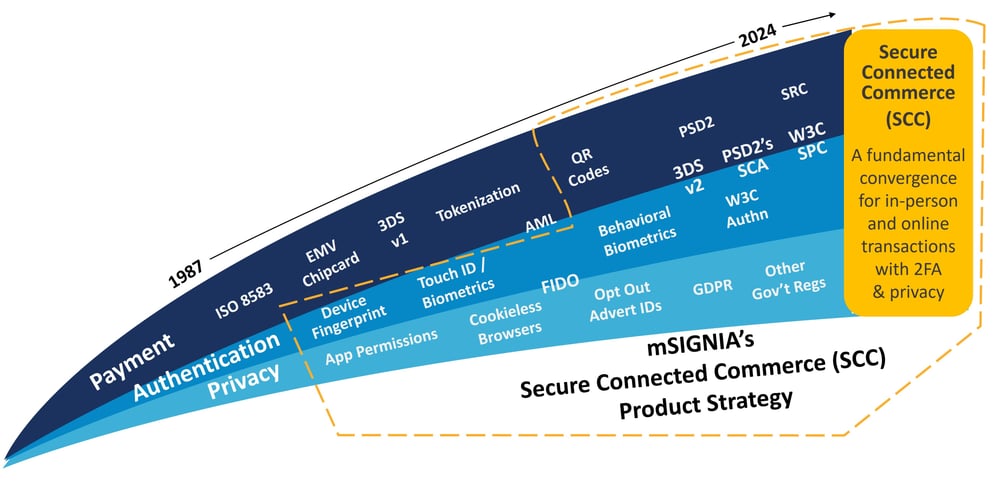About us
Testing Services and Turnkey Tools that Make Payment + Authentication Easier, Faster, and More Successful
Payment Simulator
An end-to-end payment testing service which allows (1) product developers to continuous test and prototype, (2) sales to demo, and (3) payment service providers to test their implementation of a 3rd party product.
3-D Secure SDKs
Brandable EMV 3DS certified SDKs which - when added to your 3DS Server - offer a complete checkout experience for web, iOS, and Android transactions. SDKs use 3DS v2.3 Split SDK design to make merchant easier and faster.
AI Cybersecurity Patents
Before specializing in online payment security, mSIGNIA widely patented an AI-enabled Digital Biometric. These patents are now available for license and sale.

All about us
Our Background
mSIGNIA is privately and strategically held with 3 of the top 4 investors being large, international financial institutions. Nearly half of mSIGNIA’s investors have invested multiple times in the company.
mSIGNIA is a test and software tools provider to the entire online payment ecosystem, including EMV 3DS product vendors, merchants, payment service providers, acquirers, payment networks, issuers, delegated authenticators, FIDO reliant parties, and risk scoring engines.
Our Approach
the Innovation Arc
The Path to Secure Connect Commerce
mSIGNIA’s products – developed in Europe and the US – enable compliance with EMV 3DS, PSD2 SCA, W3C, and FIDO. We are often asked about the relationship between these payment and identity standards, future standards like EMV’s Secure Remote Commerce (SRC) and W3C’s Secure Payment Confirmation (SPC), and the importance of privacy.
We have defined an ‘Innovation Arc’ (shown below) to strategically align various payment, identity, and privacy roadmaps; ultimately yielding the unified concept of Secure Connected Commerce (SCC).

The general premise is that the card-present domain is becoming increasingly connected as demonstrated by QR codes and EMVCo’s task forces for Wireless and Tap-to-Mobile. At the same time, consumer’s devices are increasingly becoming more trusted, some even to the level of an EMV chip card.
It seems inevitable, then, that in-person and remote payment technologies will converge under a ‘connected’ payment concept. Such a concept would naturally embrace and extend current market trends around authentication and privacy.
mSIGNIA uses the unification narrative of Secure Connected Commerce to enable an industry-wide migration path for 3DS + SCA + W3C + FIDO + SRC + GDPR customer efforts.
Already, EMVCo, FIDO, and W3C are jointly working to align related payment and authentication efforts. Privacy represents a recommended liaison opportunity which helps to build good-will and consumer credibility in today’s world.
mSIGNIA is proud to be a leader in the technology enabling these global standards.
Our Headquarters
If you are ever in the Southern California area, please contact us for a meeting.
Our Address
9891 Irvine Center Drive, Suite 200, Irvine, CA 92618-4320
Contact info
Email: info@msignia.com
Phone: +1-949-527-9533
Our Tagline and Mission
mSIGNIA's tagline, 'Solid Ground for a Cyber World', is all about our mission to provide a safe, stable, reliable, foundation on which we, our partners, and their customers can be successful.
The ancient definition of the term "signia" is the ground beneath your feet. In 495 BC, ancient Rome founded the colony of Signia which a struck a silver coin, called a Signia, featuring Hermes, the messenger of the gods, wearing a winged helmet.
 The term drives mSIGNIA's innovation in several ways
The term drives mSIGNIA's innovation in several ways
- As the digital world moves to the cloud, a user's identity will be the only data remaining with the user. Such data identifies and authenticates the user to the cloud. It cannot be stored in the cloud; it must be sourced from the user and their device-in-hand. mSIGNIA's SmartLink Split SDK Client is the digital embodiment of solid ground in a cyber world.
- Just as Hermes was the messenger between people of the earth and the ancient gods in the clouds, mSIGNIA's SDK Server is the messenger between users (where the Split SDK Client operates) and cloud services. mSIGNIA's Split SDK architecture manages the chaos of the client, making it easier for cloud services to thrive.
- When you are building something great, you build it on solid ground. mSIGNIA's testing and tools products offer the same reliability which enables our partners to build their amazing services which make payments safe and easy.